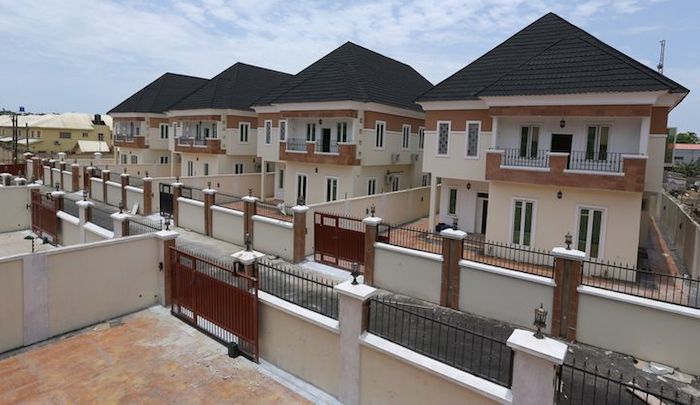The hope of total recovery for Nigerian real estate in 2020 might not be in sight, as industry experts have predicted that there won’t be a guaranteed rapid growth in the property market.
Instead, they anticipate a combination of heightened uncertainty, as financial issues globally get tighter, but a brighter day for increase access to housing for the lower echelon of the Nigerian population, if certain reforms are implemented.
According to them, the 2019 lack of liquidity in the market made the industry to underperform in terms of returns, especially for the high-income property market.
Asides the absence of liquidity in the market, the myriad of challenges bedeviling the sector including, high cost of land registration and titling, policy and licensing issues, risk-sharing mechanism, lack of adequate credit database, knowledge gaps, lack of favorable contract enforcement mechanism, cost of construction, high skilled labor costs, and costs associated with poor infrastructures, have continued to worsen the woes of the industry.
Major impediments to adequate housing provision in Nigeria have remained the mortgage rates. Findings revealed that typical mortgage interest rates in Nigeria range from five to 10 percent for Federal Mortgage Bank of Nigeria (FMBN) and 15 to 25 percent for commercial mortgage institutions, making it one of the highest in the world.
According to data from the National Bureau of Statistics (NBS), the real estate sector displaced the Public Administration sector, which reported a contraction of 14.21 percent in the first quarter of 2019.
With a housing deficit of over 18 million units, the real estate sector’s GDP growth in the second quarter 2019 is –4.78 percentage points lower, compared to the 0.93 percent it reported in Q1 2019, but is higher than the -3.88 percent recorded in second-quarter 2018.
Also, the sector continued in its low ebb in the third quarter as it contracted by -2.31per cent, from -3.84per cent recorded in second-quarter 2019, and -2.68 percent in the third quarter of 2018. The industry emerged the sector with the worst growth in Q2
Already, some economists have said the 2020 macroeconomic expectations would most likely center on a Gross Domestic Product (GDP) growth rate of 2.35per cent to 2.42per cent, an inflation rate of 12.32per cent, the external reserve of about $41.44 billion and crude oil price at the rate of $59.2bbl. Others, according to an economist, Dr. Biodun Adedipe, would include an exchange rate of N306 and N364/per dollar, diesel price of N205, and interest rate of a lower double-digit.
Adedipe and a professor of Economics from the Ahmadu Bello University, Zaria, Muhammed Usman have also maintained that the Nigeria economic performance for the 2020 would also be dictated by major occurrences in the global space particularly the trade war between the United States of America and China, rising protectionism with regards to, ‘America first’, ‘No-deal Brexit’ and xenophobia in South Africa, Ghana and Togo, which might impact on diaspora remittance and investment in real estate.
Out of the N2.14 trillion proposed capital expenditure for the 2020 budget, works and housing have the highest capital allocation of 12 percent. While construction and rehabilitation of roads would consume a budget size of N210billion, the federal government national housing and social housing scheme (Family homes fund) will gulp an estimated N17.5 billion and N30 billion respectively.
Although experts say the budget was a step in the right direction but expressed concerns on the nation’s consistent history of lack of funding and poor implementation of the budget
A past president, International Real Estate Federation, (FIABCI) Nigeria, Chief Kola Akomolede said the performance of the sector in the outgoing hasn’t been impressive but better than 2018. He said the contribution of the real estate is not as encouraging as it supposes to be.
Akomolede said the economy is down and money is not available as it used to be stressing that even those who have money were not free to spend it anyhow because of legal issues.
“It’s good for the economy in the long run because of the way we were going before the new regime, it would have gotten to a point where the whole system may collapse. You could imagine a situation where people were renting three-bedroom flats in Ikoyi at $300,000 yearly as rent. You don’t even get that in New York City. It was overpriced because there was money in the hand of people and money they didn’t work for.”
He said in the outgoing year, there was a little boom in the lower echelon residential property, as people were either buying houses for their own occupation through a mortgage or pay for it within a range that is below N50 million.
The property market, he said is going to improve in the year 2020 ‘but we don’t expect any rapid change. It’s not going to happen because all the indicators have not changed and there is no sign that they are going to change. The clampdown on corruption and financial issues would get tighter’.
“But for the lower level, the federal government has directed that to obtain mortgages for houses, for a certain amount below N5 million, you don’t need a percentage deposit. This might increase access to housing for lower echelons of people and that will increase to the facility and increase demand for housing and developers will divert to building houses that are within the range in the new year”, he stated.
Immediate past president of the Nigerian Institute of Building (NIOB), Kenneth Nduka said there would continue to be increasing demand for residential spaces in 2020 because the Nigerian population will continue to increase and the housing deficit would also increase.
“The majority of people who build houses in Abuja couldn’t sell in the outgoing year and so you have a lot of vacant houses scattered around Abuja and other places. So there is great uncertainty as regards rapid growth in real estate next year. Most estate surveyors would tell you that their members are not doing well because most of their clients owe them. Because of the economic climate, we are in a state of persuading occupants to pay”
No doubt the disposable income of most Nigerians has been relatively low coupled with the fact that the government’s interventions in housing were also low, thus impacted negatively on real estate’s performance in 2019.
A past president of the Nigerian Institute of Architects (NIA), Tonye Braide lamented that private real estate development in certain major cities in 2019, was low even though demands for housing continue to rise.
“Many people who had access to capital were building but the rate of returns has dropped. The boom in which people used to buy off-plan has dropped in Abuja. In Port Harcourt, there is still a lot of real estate boom, same in Lagos, Akwa Ibom. In civil servants city like, Calabar is been a little bit slow. Despite the fact that a lot of building materials gone up, the actual prices of houses haven’t gone too high because contractors and developers have to reduce their margin to be able to sale.
He said, “There is hope that things would pick up because the government has also increased the lending/deposit ratio as a result of that bank will have to put in more money into the real estate sector. Real estate is an area that banks could feel safe because they could practically see the money and monitor. Some state governments have been very lazy in issuing titles and without appropriate title, you will not gain access to necessary finance.
Braide said for rapid transformation to take place in the sector in 2020, the process by which banks could recover loan out money for real estate projects must be made easy so that banks wouldn’t shy away from real estate investments.
“In 2020, if the government concentrates on the provision of infrastructure, we will find a rapid recovery. It is still the private sector that would help in the provision of adequate housing. There is a need for infrastructure to be improved upon by the government to bring down the cost of housing provision for the people. So that developers will not have to transfer the cost of provision of infrastructure on the people. Also, the element of compensation must be dealt with because many housing projects didn’t take off in 2019 due to the fact that the natives claim that they were not compensated,” he said.
Essentially, the President, Association of Town Planning Consultants of Nigeria (TOPCON), Niyi Odetoye said the development in the property market has been badly affected by the economy generally. He said the high-end sector was mostly affected because that segment was mostly hit by the economic recession.
“The property market was mostly affected because developers concentrated on high-end housing. If we have been doing a lot of social housing and providing homes for the middle-level income earners, the challenges posed by the economy won't have affected the sector.
“If you actually conduct a survey, you will discover that a lot of people who are into housing are trying to rejig their business development plan by providing housing for those in the middle-income category. Those are the ones that could easily access mortgage and that tells us that there is still opportunities for those housings that fall within N10million to N25million.”
For 2020, he said there would still be a lull in the provision of housing for the high-end segment, however, there would be a boost for those in middle-income, hence the focus for developers/investors in 2020 should be how to catch the market for the provision of housing for the middle-income earners.
source: Victor Gbonegun


















